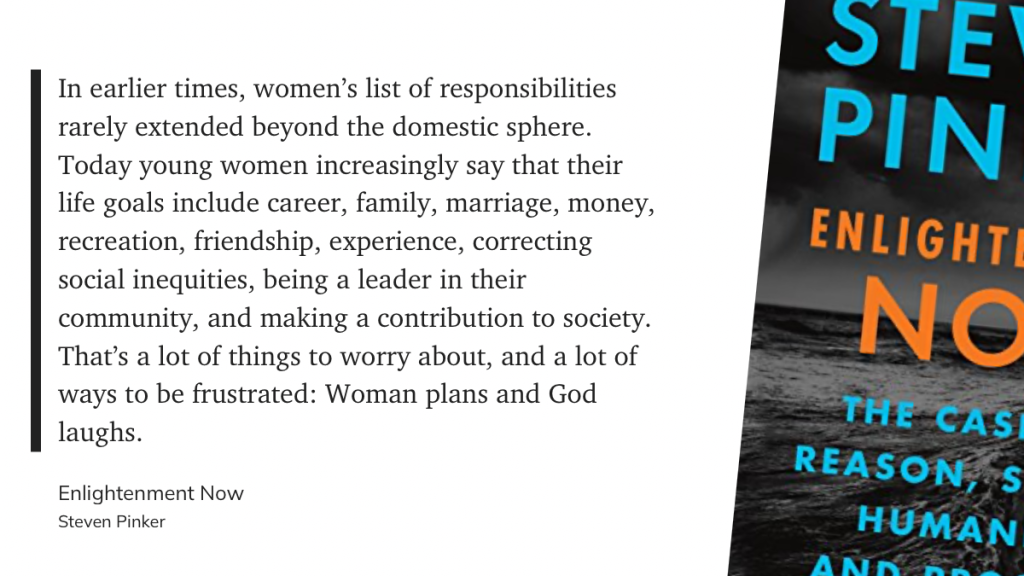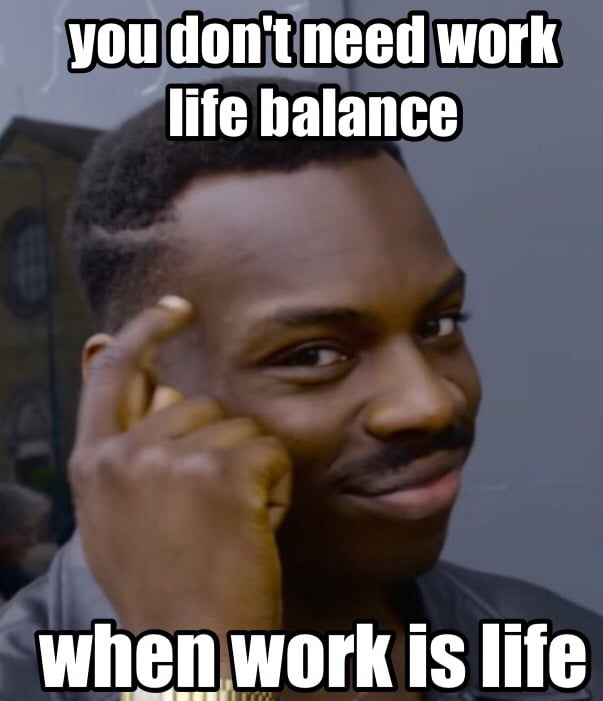Global happiness and the anomaly of American women
I’ve slowly been working my way through Steven Pinker’s thorough (aka long), interesting and enjoyable Enlightenment Now. It’s a deeply optimistic book that looks at various measures of human progress, happiness etc and concludes that, despite the regular pessimism in the news, there has never been a better time to be alive.
In the chapter on Happiness, Pinker describes how, overall (and for nearly all social groups), levels of happiness and satisfaction have increased, and anxiety has reduced.
Are we really so unhappy? Mostly we are not. Developed countries are actually pretty happy, a majority of all countries have gotten happier, and as long as countries get richer they should get happier still. The dire warnings about plagues of loneliness, suicide, depression, and anxiety don’t survive fact-checking.
Pinker, Steven. Enlightenment Now (p. 283). Penguin Books Ltd. Kindle Edition.
Pinker goes on to mention that American baby boomers haven’t gained happiness at the same rate as other people in the developed world, and in particular, American women “have become unhappier just as they have been making unprecedented gains in income, education, accomplishment, and autonomy, and in other developed countries where everyone has gotten happier, the women have been outpaced by the men.”
Why is this? Pinker’s hypothesis is that the freedom that American women have (belatedly) begun to experience brings with it some anxieties:

Now I don’t know if this is actually the case (although it’s a compelling argument), but it got me pondering the sources of my own previous anxieties and stresses, and I think it could certainly go some way to explaining them.
A singular life goal
I trained as a teacher in 2005/6 and my first school was an absolute joy to work at. I had a truly supportive department (who encouraged and nurtured me and forgave my many mistakes). I threw myself into the pedagogical style of the time (discovery learning, learning to learn etc) and was pretty good at it, purely because I was willing to put in the hours to make it work. I was regularly working 60-70 hours/week. Roughly half of each holiday was spent on schoolwork.
This got me lots of positive feedback (from pupils and staff). I was getting praise and this was a good feeling! I got rapid promotion, had a great bunch of encouraging colleagues, and the positive feedback loop continued. It kept me working all the hours under the sun (and I thought it was worth it).
This all sounds totally cringe and pathetic when I read it back now, but here’s the thing: being a teacher had become THE core aspect of my identity. It was what I was apparently good at. And when you’re good at something you tend to want to do it more (and get better). I had ambitions to keep improving, be a headteacher by my mid-thirties, a proper trailblazer.
And there was only really one way I could do that. Work more.
The problem is that teaching isn’t a job with a fixed target. You can never fully complete it. There is always more to do, things to improve. You could give every waking hour to it for a lifetime and still have areas for development. So by putting teaching at the centre of my identity, by making it my main (only?) focus in life, I had set myself an unachievable goal.
I’d set myself up to fail.
Which is pretty much what happened when my first child was born. Spending 60+ hours a week on work became both impossible and undesirable.
Moving the (life) goalposts
It took a while for me to recognise that I couldn’t manage both being the teacher I had built myself up to be AND be a decent parent. I did a suboptimal job of both for a while, and it made me unwell. Like Pinker’s unhappy American women, I had a lot of things to worry about, and a lot of ways to be frustrated. My teacher and father life goals required more mental, physical and emotional energy than I could give, and it just led to anxiety and dissatisfaction. My professional self-identify collapsed. I had to take a step back and reevaluate what I really wanted. When you’re so heavily invested in something that can be a difficult thing to do.
It took a while, but I shifted my targets to something more attainable.
- Family first. If I can’t support them properly, other stuff has to change
- Be the best damn teacher I can be, within the framework of a sensible work/life balance.
These are the criteria I now measure myself against. Challenging, but attainable, and above all, sustainable (I’ve got another 27 years before I can collect my pension!)
Point 2 is what requires discipline. Some strategies that have been effective:
- I set myself loose time limits for work (and stick to them).
- I loathe doing a bad job of something. I’d rather do less (and do it well) than compromise on quality, so I’ve had to get better at saying “sorry, but I’ve not got the capacity” to stuff (including stuff that I’d really like to do).
- I have routines that mean regular sleep and exercise are as high priority as any other activities.
- I recognise that guaranteeing myself time to decompress, read, spend time with the family actually makes me a better and more effective teacher.
- I regularly check myself to make sure I’ve got the balance right, and any big professional decisions are viewed through this lens. There are a couple of occasions where I’ve moved to a role with less responsibility (and a hefty pay cut) to get the work/life balance correct. I’ve not regretted it yet.
Being a teacher can become all consuming, and shifting your identity to incorporate something else significant (like being a parent) can be a real shock. I know I’m not the only teacher who’s faced these challenges. I have colleagues and friends who are dealing with this, right now. And that’s why I’m writing this, in the hope that sharing my experience somehow helps others going through similar.
As teachers we need to be a little kinder to ourselves, reframe our goals, and play the long game. Too many good teachers leave the profession, broken by trying to do too much.
As humanists we want to be driven by compassion, but the targets of our compassion should include ourselves.
Greta Christina, Humanism and a Work/Life Balance
If you’ve experienced similar, and have found workable solutions, I’d love to hear your story.


One thought on “Teaching and the pursuit of happiness”